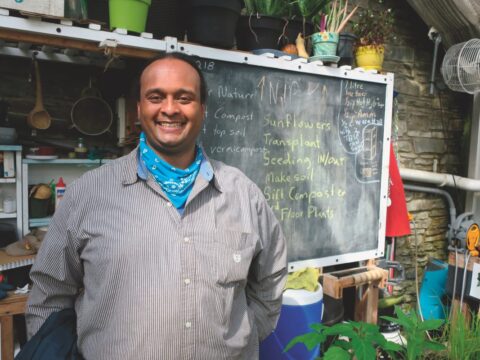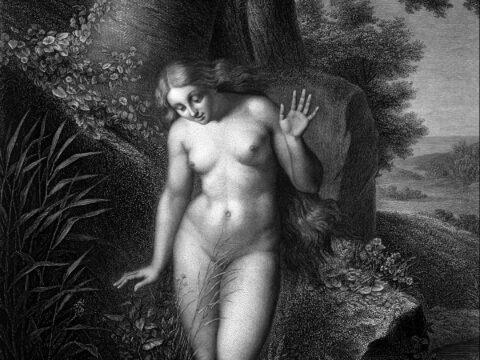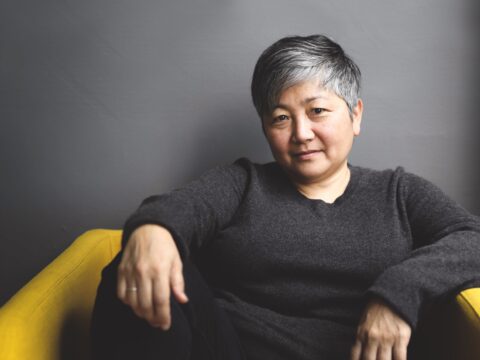The 1630s were a hard time for Bavaria. A civil war was raging, and as soldiers came home, they brought a disease with them. The plague killed dozens in the village of Oberammergau in 1633. The villagers made a promise to God that if they were spared from further ravages they would perform a Passion play every 10 years as thanks.
That promise has been fulfilled almost every decade for nearly 400 years. Christian Stückl, whose family dates back to the very first play, was set to direct his fourth production in 2020 before it was delayed until 2022 due to the COVID-19 pandemic. For 40-plus years, he’s been dismantling centuries of accumulated traditions, including anti-Semitism, that have clung to the play.
You may unsubscribe from any of our newsletters at any time.
More on Broadview:
- Unravelling the myth of Mary Magdalene
- As a married, queer Catholic, I don’t know how much more hurt I can take
- Dream of 3 faiths worshipping in one building meets reality in Berlin
His passion for the work is no less diminished over time. He spoke from his Munich offices with Broadview associate editor Andrew Faiz.
Andrew Faiz: Why did the villagers choose a play as their promise to God?
Christian Stückl: At that time, nobody knew about infections. They thought it was a punishment from God. Some villages built chapels to saints in response. And there were Passion plays all across Bavaria in that period.
AF: That first play in Oberammergau is a classic battle between good and evil. It opens with the devil on stage.
CS: In 1634, Lucifer was the first person on stage, and he says, “I am very afraid; I built this world in this way, and now this young man has come from heaven, from God, and he is going to destroy our world. So we have to kill him, to take him away, otherwise our way of life will change and we will lose our power over the world.”
AF: And that’s the play for a century or so.
CS: From 1634 to 1750, we have a script from Augsburg. In 1750, a monk from a nearby monastery writes a new one exclusively for Oberammergau. Our Passion play becomes very important, because now we have one of the best texts.
AF: The play changes from a battle between heaven and hell to a battle between Jesus and the Jews.
CS: The intention was no longer to deal with allegory, with heaven and hell, but to make the play more “historically correct.” Hell was replaced by a synagogue. But nobody involved with the play had ever been to the Holy Land. The costume designers wondered how the Jewish priests looked in Jesus’ time. What kind of hat did they wear? They took a Catholic priest’s mitre and they turned it sideways, and it looked like horns. So, the Jewish priests looked a little bit like devils.
AF: On the 300th anniversary of the play, the Catholic Church bestowed a missio canonica to affirm that the church’s beliefs were being taught by the Passion play, and Hitler also gave his blessing. The state and the church blessed this production.
CS: Oberammergau is a small village, but we have two large monasteries, left and right. From 1634 to 1900, the play was in the hands of the Catholic Church — the direction, the costumes, everything. All directors were priests of the church.
In the late 19th century, artists and playwrights from all over Germany came to see the play. Then people from across Europe heard about the play. In 1890, Thomas Cook saw the play. He was a British minister. He started organizing tours to Oberammergau. We had 200,000 visitors in 1910. The play was delayed two years because of the Spanish flu and the First World War, and in 1922 we had 300,000 visitors.
Hitler saw the play in 1930 and called it “essential to the Reich.” Many intellectuals also saw it — Max Reinhardt, Jean-Paul Sartre, Simone de Beauvoir — and they liked it.
At the same time, the play was being criticized for its anti-Semitism. Rabbi Josef Krauskopf saw it in 1900 and gave a series of lectures detailing the anti-Jewish depictions in the play. In the mid 1900s, other intellectuals, like Arthur Miller and Leonard Bernstein, also condemned it.
AF: The story of Oberammergau is in part about tradition — how it is built, how it is recreated and how it changes.
CS: I think tradition is very complicated to speak about.
The play used to change every 30 years to reflect changes in society. But these changes stopped when Thomas Cook started bringing people, because the people of Oberammergau started to earn money. In the village they said, “This is the play we have done for 300 years. We have a long tradition.” Even my grandfather wrote [in the 1950s] that things were bad under the Nazis, but our play is older than that, it is the same play we did in 1922, so please stop saying it is
anti-Semitic.
I started to change the play, but I think I am also part of the tradition.
We had a play for the Baroque times, we had a play for the Enlightenment, we had a play for the Nazi times, and now we need to look at how we tell the story in our own times. We have to get rid of all the anti-Semitic things. And we have to think of Jesus as a Jew. He goes to a synagogue. He has a bar mitzvah.
AF: And the menorah is now at the Last Supper.
CS: The menorah had been in the room where the people were saying Jesus has to be killed. And I said, “No, we take it out of this room, and we give it back to Jesus because he was a Jew.” So we’re trying to get the anti-Semitism out of the text and out of the costumes and the set design.
AF: Part of the tradition in the village is who can be in the play.
CS: Until 1900, Oberammergau was a small village, less than a thousand people. Around 1900, the village grew to 1,400. The Catholic priest said you have to live in Oberammergau for 10 years to participate in the play. He started to make rules.
After the First World War, we had refugees, mostly from the eastern part of Germany, and we grew to 3,000 people by 1934. So we changed the rule again to say you have to have lived here for 20 years.
We had rules that only Catholics could have one of the main roles, and for all the other parts you had to be a member of the Catholic or Protestant church. And we accepted only unmarried women on stage.
For me, it was very stupid. In 1990, one of our best actors was a married woman, so I said, we have to change that rule. The city council agreed.
In 1990, I gave a Protestant a main role for the first time. And the Catholic priest was very angry, and he said to me, “You are destroying the play. It has to be a Catholic play.” I said, “Even my grandfather is a Protestant.”
For 2000, we extended that to non-Christians. In 2022, we have two Muslim actors: one is Nicodemus and one is Judas.
AF: What is tradition? We think of it as solid. But maybe it is more liquid — it moves and changes with time.
CS: To bring the play to the next generation, you have to bring it to your time. I’ve been doing this since 1990, and each time I have to work on the text. I have to speak to a new generation of actors. My conductor has to build a new orchestra. The set designer has to create a new stage.
AF: Is the Passion play an act of worship? Worship and theatre have been DNA strands for thousands of years.
CS: Bach wrote the St. Matthew Passion — he told the story with music. I tell this story with theatre. Theatre has to be open. We don’t have dogma in theatre. It is not a holy mass.
A bishop of Munich told me it has to be a holy mass — you have to bring Jesus on the stage like a real human being and like a god. I say, if I can bring a real human being on stage, then that is enough for me. You can think about God.
AF: Do you plan to direct the 400th anniversary production in 2034?
CS: (Laughs) I’m here for today.
***
Andrew Faiz is an associate editor at Broadview.
This interview has been edited and condensed for length and clarity.
This story was first published in Broadview’s April/May 2021 issue with the title “Dismantling Tradition.”













